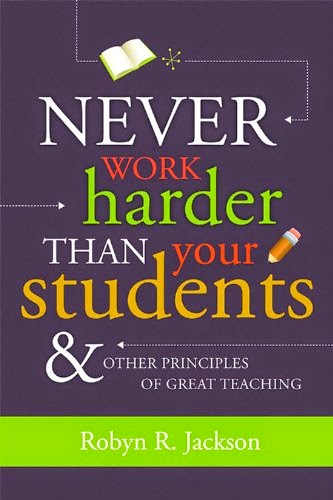Please be warned: the following information is about good pedagogy, and not necessarily flipping the classroom....
Dear all,
Welcome to Mr Burns' first book review!
Over the past year or so I have read two books (on education) that I thought were particularly noteworthy and worth sharing.
The first was 'Never Work Harder Than Your Students'. Great title; I had to read it; and I'm really glad I did. Though the title turned out to be a little misleading...
There were a few things I took from this book, but I think the stand-out idea for me was to literally write the assessment first (based off the outcomes), and then plan the unit.
I had been thinking a little along these lines for a while, but it was good to actually read a Doctor of education thinking the same way. Peter and I started deliberately programming like this last year and we found it very helpful in keeping our lessons on track, and ensuring that we really do assess what we value.
Furthermore, this text had some great ideas regarding the value of repeating student assessment until students manage to pass...
There were many other thought-provoking ideas in the text and I have an egg and bacon-stained copy at home if you would like to borrow it.
The second text I read (and my favourite) was a book called 'Brain Rules' by Dr John Medina. This is a brand-new book, chronicling the latest developments in brain research. This book was written particularly for teachers, students, learners, and generally anybody else (with a brain) who is interested in functioning more effectively and efficiently and human beings.
Two major ideas I thought worth sharing from that text include:
1) We are all visual learners! (Maybe a lot more than we thought?)
The brain (apparently) has 50 percent of its mass dedicated to using and interpreting one sense. This sense is vision. These parts of the brain are not shared. So this means that half of all grey-matter is about seeing. This is regardless as to whether we have ticked the visual, auditory and or kinesthetic box in any survey we may or may not have competed.
The lesson here for me: at all costs do not over- monologue, and always try to have some sort of visual aspect ongoing in the lesson.
I have noticed this in my own behavior when battling to pay attention in sermons! As soon as the preacher pops on a visual - I'm back! (And I’m apparently an auditory learner.)
2) Good news. There is a magic pill that cuts all mental and physical decline basically in half, and assists in recall and learning by nearly the same amount (30 per cent).
It is called exercise; and a case could be made that most of us do not do nearly enough.
This is not just exercise after work or school either- this is during.
In the United States some CEOs have installed stair-masters in their offices, enabling them to type emails and walk at the same time. My students have been told to wear joggers from 8:30am to 1:50pm, because now 5B just goes for 'jogs' at particular intervals; if we have been sitting for too long - we jog.
Here’s a thought; should we install a couple of stair-masters in any new built environments?
Again – I have a coffee and egg-stained paper-back at home if you are interested in reading this text. It was an enjoyable and informative book.
Thanks for sharing my thoughts – and feel free to feedback if you have any thoughts or ideas.
I have also started to consult in NSW primary and high schools with regards to flipping (or blending) the classroom. If you are interested in having me come along to speak to your staff, details can be found here: https://sites.google.com/site/mattburnsflipyourclassroom/
I have also started to consult in NSW primary and high schools with regards to flipping (or blending) the classroom. If you are interested in having me come along to speak to your staff, details can be found here: https://sites.google.com/site/mattburnsflipyourclassroom/

